Scotland vs England: Five of the best games throughout the 150-year history of the Auld Enemies
Scotland vs England is a game about to be rekindled as they play their 116th match in a 150th anniversary friendly
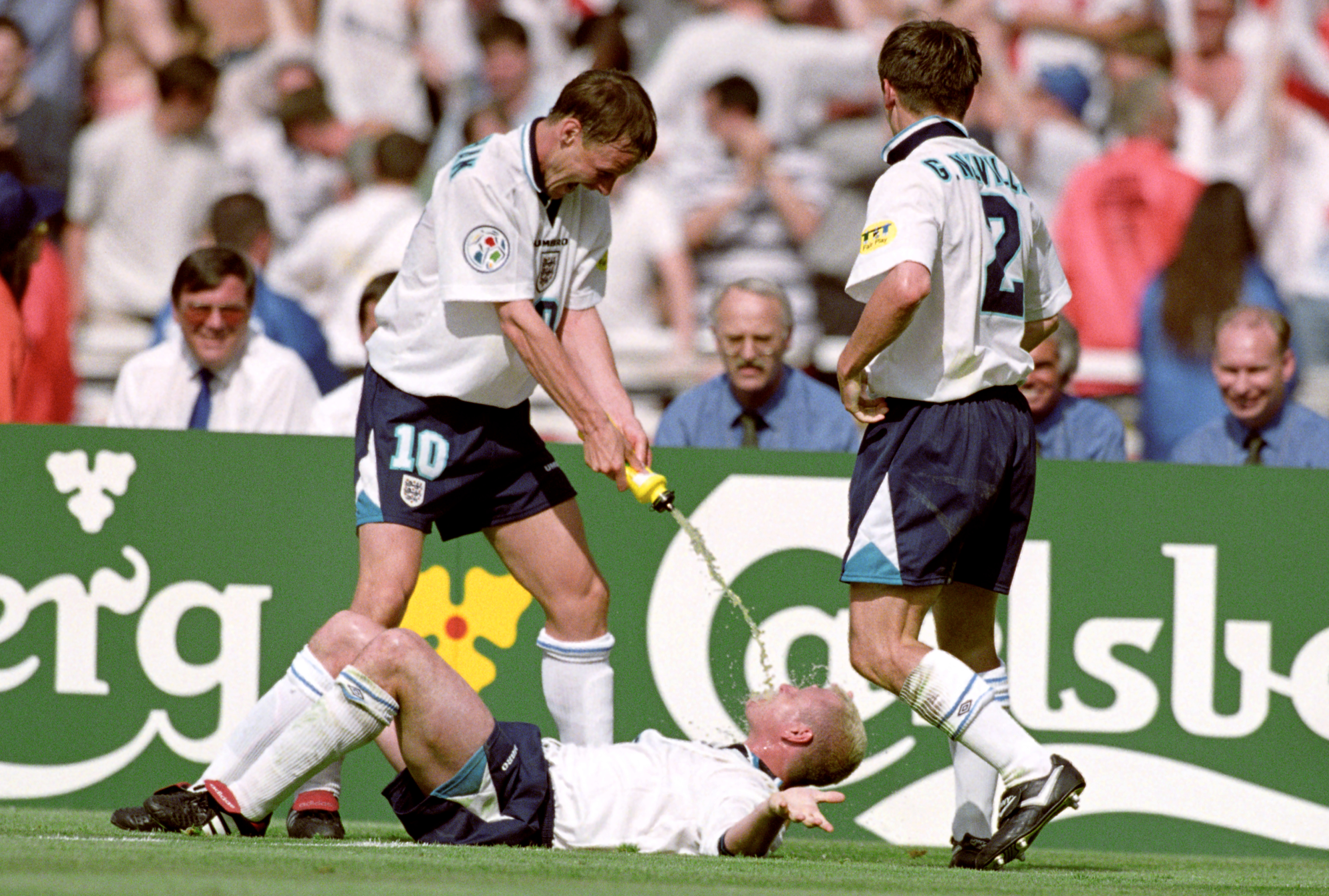
Scotland vs England is the oldest fixture in world football, dating back to November 30, 1872, when the two nations played out a 0-0 draw at Hamilton Crescent in Glasgow.
Since then, the pair have faced each other 115 times in total, with England edging Scotland in their head-to-head record. Indeed, the Three Lions have won 48 times, their rivals on 41 occasions, with 26 stalemates between them.
That's not to say that Scotland haven't had some seismic victories during their encounters, though, as FourFourTwo details in greater depth below...
Scotland vs England: Five of the best games throughout the 150-year history of the Auld Enemies
England 9-3 Scotland
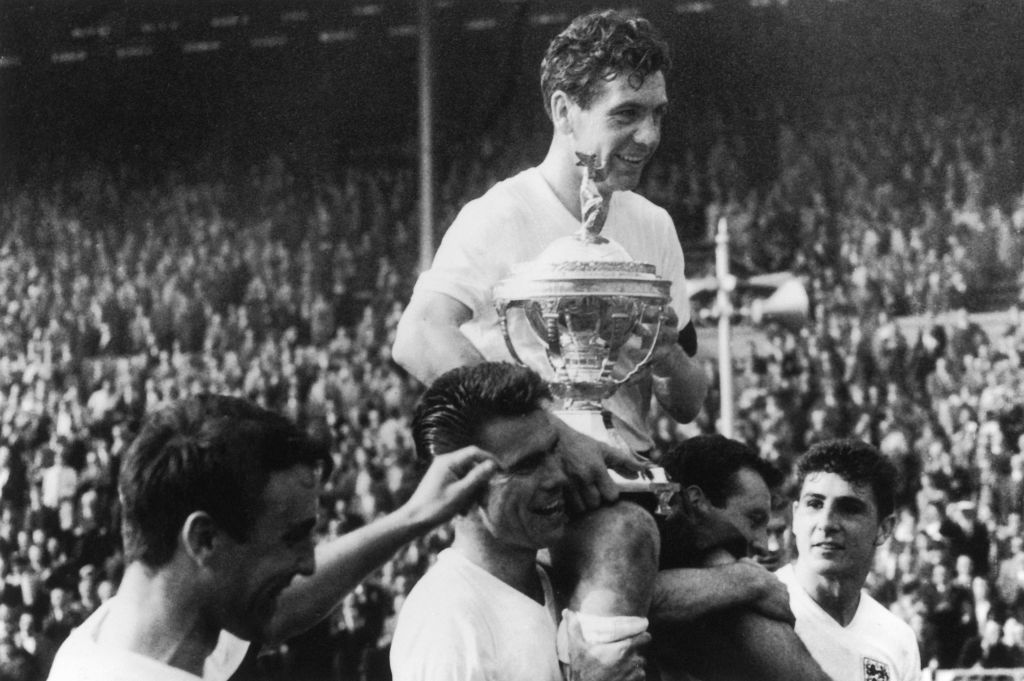
April 15, 1961 - British Home Championship
The biggest victory in the rivalry between Scotland vs England belongs to the Three Lions, who demolished the Tartan Army 9-3 at Wembley during the final game of the British Home Championship in 1960/61.
Jimmy Greaves bagged a hat-trick that day - the last player to score three goals in the fixture - with Bobby Smith and captain Johnny Haynes grabbing a brace, while future manager Bobby Robson also found the net, too.
Frank Haffey, in the Scotland goal, received plenty of criticism for his failure to keep out more strikes, but the rate at which they rained down upon his goal made it seem an inevitability that the scoreline would continue to rise.
Get FourFourTwo Newsletter
The best features, fun and footballing quizzes, straight to your inbox every week.
Scotland striker Dennis Law, who played in the game, later revealed that Haffey was unhappy with his performance on the day, though.
“No self-respecting Scot would want to talk about this match," Law later said. "I would not dream of putting the blame on any one player but Frank Haffey himself admitted that on any other day he would have stopped at least five of the goals. Johnny Haynes and Jimmy Greaves could not believe their luck. We gave them the freedom of Wembley.”
Greaves pointed out in his autobiography that more players should also have taken the blame for the result.
“It’s true he had a poor game," Greaves said, "but Frank wasn’t the only Scot who didn’t perform well that day. In truth, I don’t think any international team of the time could have lived with England that day. Johnny Haynes was outstanding.”
England 2-3 Scotland
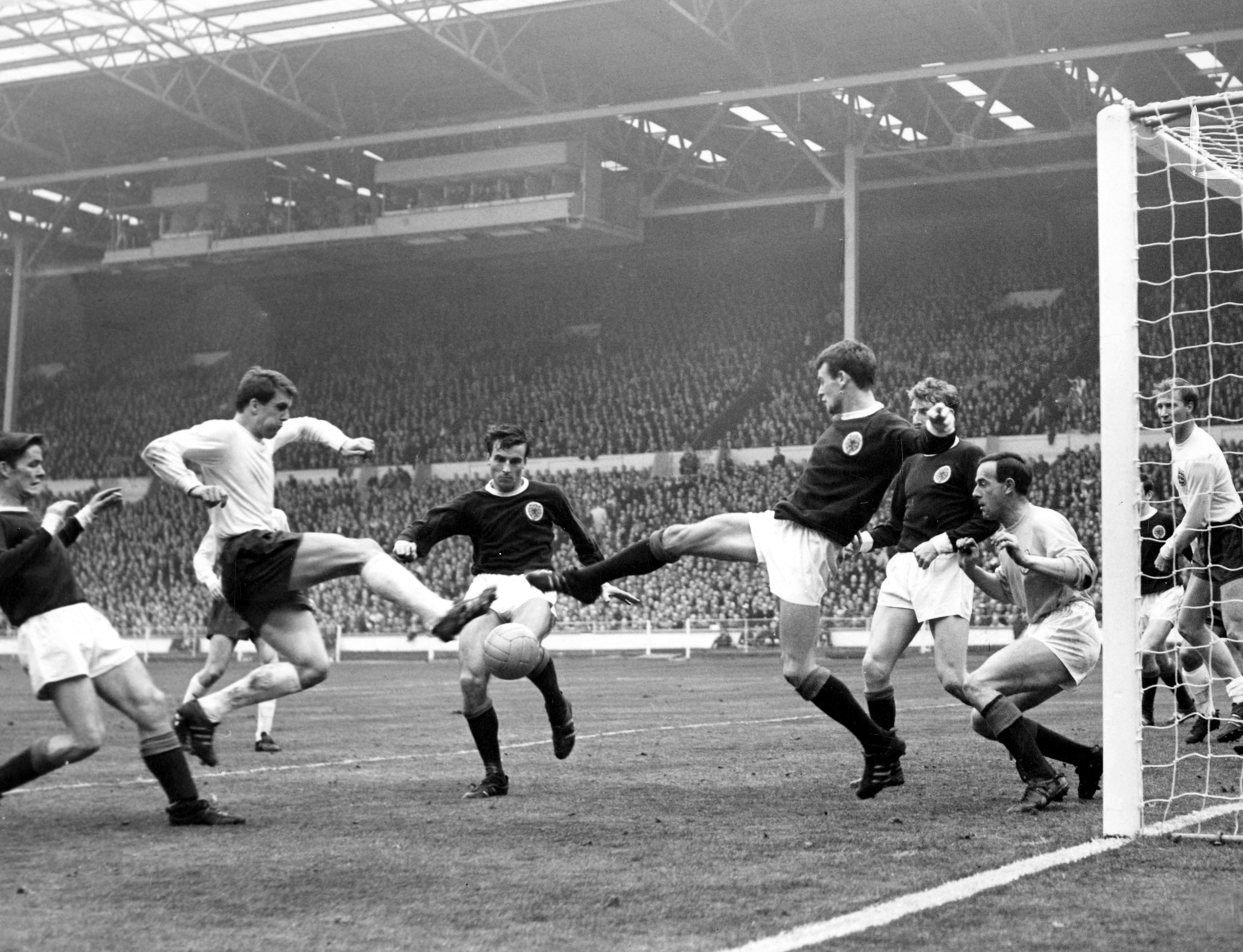
April 15, 1967 - Euro '68 Qualifiying Group 8
The Jules Rimet trophy wasn’t up for grabs, but Scotland proclaimed themselves unofficial world champions after beating England in 1967. Alf Ramsey’s men had won the World Cup a year earlier and were enjoying a fine 19-game unbeaten run, but they were second best when the Scots came to Wembley 10 months after English football’s greatest ever day.
More than 99,000 squeezed in for the conclusion of the 1966-67 British Home Championship. Having already beaten Northern Ireland and obliterated Wales 5-1, England were natural favourites to win the tournament – not least as they only needed a draw to triumph, with Scotland a point behind. The match also doubled up as a Euro 68 qualifier, so neither side was short of motivation.
Scotland had been absent from the 1966 World Cup, and wouldn’t show their faces at another major finals until 1974. Their team wasn’t short of accomplished players, though: Ronnie Simpson, Tommy Gemmell, Willie Wallace and Bobby Lennox would win the European Cup final with Celtic just a month after this clash, while the talents of Denis Law and Billy Bremner were already very well known to English supporters.
Scotland were underdogs nevertheless, although they hardly played like it; the insouciant Jim Baxter was so at ease that he started doing keepie-uppies at one point. Sure enough, Law nudged Scotland ahead in the 27th minute, tapping home from close range after Gordon Banks had failed to hold a shot from Wallace.
That’s how it remained until a chaotic final 12 minutes in which the British rivals exchanged four goals. First, Celtic’s Lennox doubled Scotland’s lead, before Jack Charlton, nursing a broken toe, rounded off a sweeping team move to halve the deficit. Jim McCalliog promptly restored Scotland’s two-goal cushion, only for Geoff Hurst to respond almost immediately with a header from Bobby Charlton’s excellent cross.
“I knew the Scots were taking it very seriously when Denis came onto the pitch wearing shinpads,” noted his Manchester United team-mate Nobby Stiles. “I’d never seen him wear them before.”
England couldn’t muster an equaliser despite all their efforts, leaving Scotland free to celebrate a memorable victory over the world champs. Given that they later missed out on qualification for both Euro 68 and the 1970 World Cup, this was maybe yet another example of the Scots’ speciality: a glorious failure.
VIDEO: Why Gareth Southgate's England doesn't look very good
England 1-2 Scotland
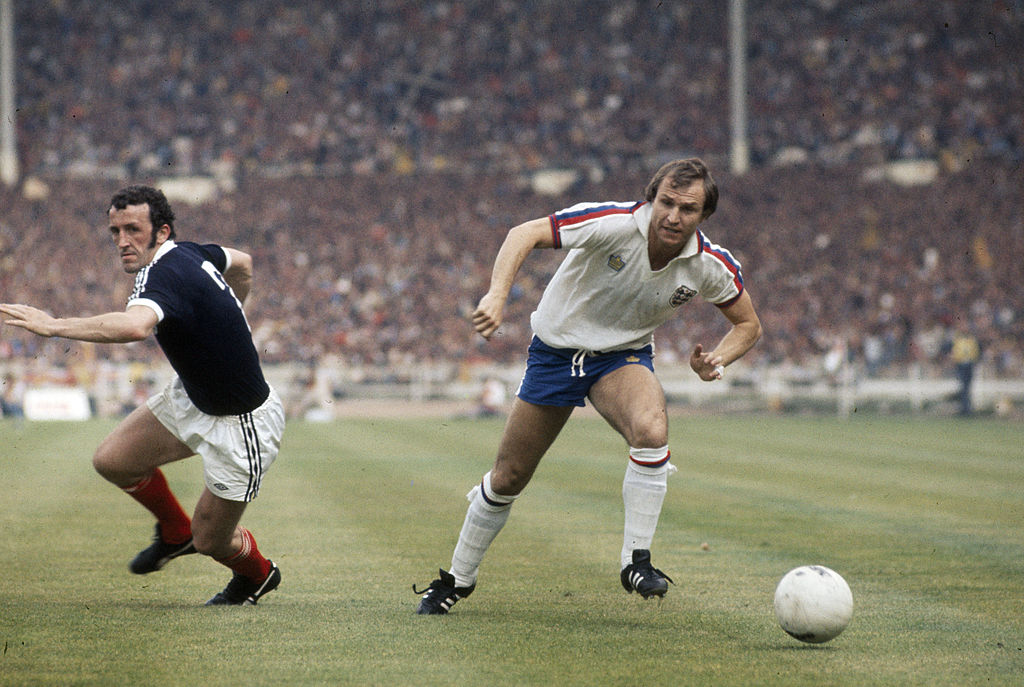
June 4, 1977 - British Home Championship
Scotland had to wait another 10 years for their next win in the Auld Enemy’s back yard – but the Tartan Army sure made the most of it.
After their side’s fine success in 1967, a handful of Scottish fans had spilled onto the turf in jubilation. A decade later, they kicked things up a notch. Amid rising hooliganism and nationalism on both sides of the border, the second invasion was held up as proof that the rivalry had grown too intense for its own good. Indeed, it was one of the key events that convinced football’s stuffy authorities to discontinue the Home Championship seven years later.
A 1-1 draw between Northern Ireland and Wales a day earlier made England and Scotland’s encounter a winner-takes-all affair. Tens of thousands of Scots had made the biannual pilgrimage to London, seemingly outnumbering the England fans on Wembley’s terraces. “Everywhere you look are Scotland flags,” remarked a bemused John Motson on commentary.
Ally MacLeod’s men drew first blood through Gordon McQueen, who rose highest to power a header into the bottom corner from Asa Hartford’s free-kick. Later, Kenny Dalglish extended their advantage on the hour mark, scrambling the ball over the line after England failed to clear the danger. The hosts pulled one back through Mick Channon’s 87th-minute penalty, but it was a case of too little, too late for the tamed Three Lions.
When the final whistle was sounded, Scotland fans – including a jubilant Rod Stewart – rushed onto the pitch and began pulling up chunks of turf to take home as souvenirs. A particularly daring bunch then clambered onto one of the crossbars, which buckled under the weight. A euphoric outpouring of joy had quickly descended into over-exuberant vandalism, and riots in London that night further tarnished the game’s reputation. The FA announced that they would erect fences around the Wembley pitch by the end of the year.
This victory was a feather in the cap of Scotland boss MacLeod, however, who is still famously (but incorrectly) attributed with the proclamation that his side would then win the 1978 World Cup. Don Revie in the opposite dugout, meanwhile, soon revealed that he was quitting England to take charge of the United Arab Emirates.
Scotland 0-2 England
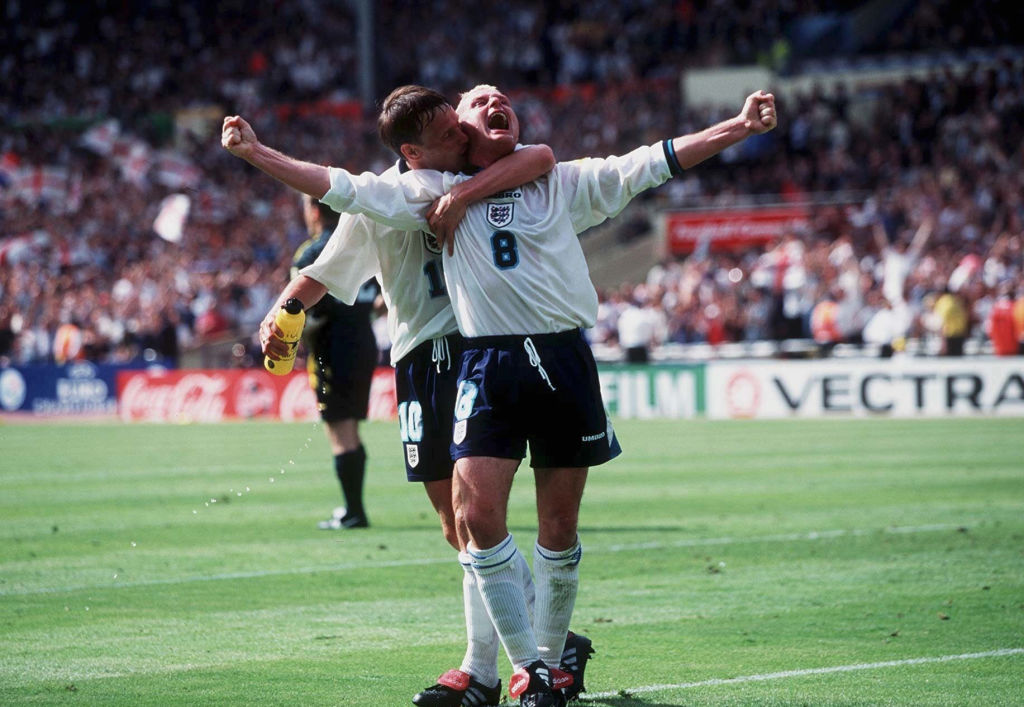
June 15, 1996 - Euro 96, Group A
Ahead of the draw in December 1995, rumours were rife that England and Scotland would be deliberately kept apart in the group stage for Euro 96. So, when the two names were pulled out of the hat in quick succession, excitement about the first major tournament on English soil in 30 years kicked into overdrive.
England’s expectations were checked, however, following an underwhelming 1-1 draw against Switzerland in their opening encounter. Scotland had held the Netherlands to a scoreless stalemate, meaning the winner of Wembley’s Battle of Britain would be in a strong position to progress to the quarter-finals.
Terry Venables switched to a back three for the Scotland game, deducing that his side should replicate the Dutch’s system. England struggled to get going during a tense but forgettable first half, but the half-time introduction of Jamie Redknapp proved decisive. “When I came on for the second half, I was walking on air,” Redknapp later explained. England were able to retain possession far better with the Liverpool man in the middle of the park, and had their rewards when Alan Shearer headed home an opener in the 53rd minute from Gary Neville’s cross.
Scotland weren’t done, though, and had the chance to level things up when Tony Adams felled Gordon Durie in the box. Up stepped Gary McAllister, whose spot-kick was saved by David Seaman after the ball had curiously wobbled on the spot just before he had made contact. The spoon bothering Uri Geller later claimed it was him what done it, but nobody minded much – not least after what came next.
England put the game beyond Scotland in magnificent fashion. Paul Gascoigne, playing his club football for Rangers, flicked the ball over Colin Hendry’s head before unleashing a volley past Andy Goram, sending Wembley into raptures.
The celebration was just as brilliant as the goal. Teddy Sheringham squirted water into Gazza’s mouth, re-enacting the ‘dentist’s chair’ drinking game that had earned England severe media criticism following a pre-tournament trip to Hong Kong. Everything changed: the players and press were on the same side again, and fans dared to dream.
“The pivotal match was Scotland,” said Paul Ince. “That was the one.”
England 2-1 Scotland (Aggregate)
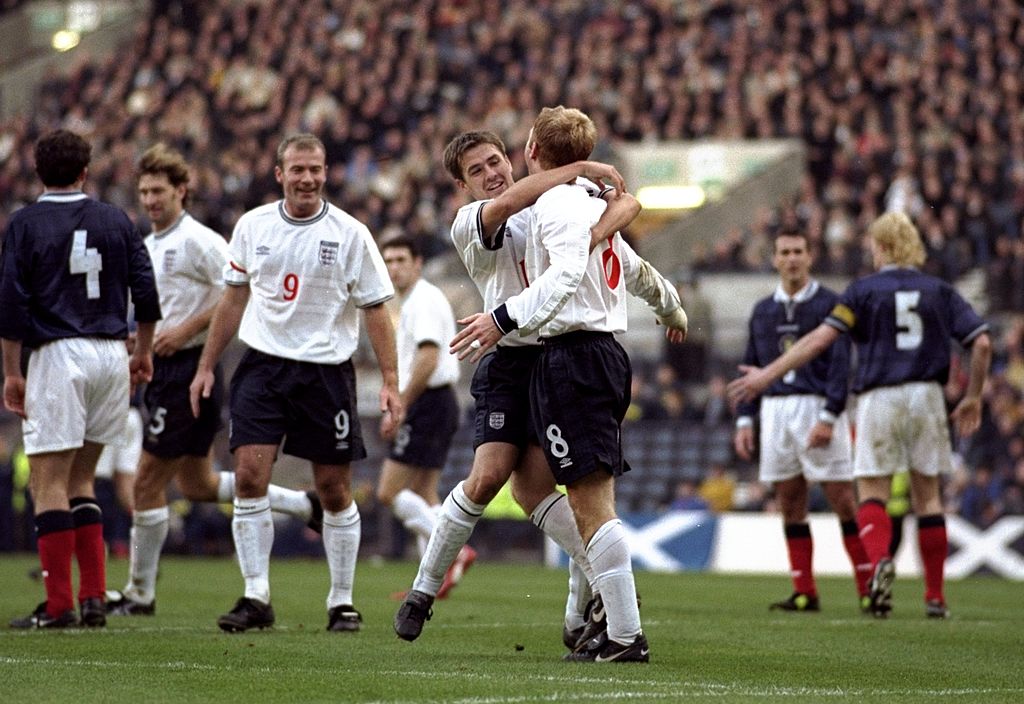
November 1999 - Euro 2000 play-offs
England were grim in qualification for Euro 2000, winning only three of eight matches (two of which were against Luxembourg) and finishing nine points behind group winners Sweden. Kevin Keegan’s side only just squeaked into the play-offs courtesy of a superior head-to-head record over Poland, who they beat 3-1 at Wembley.
Scotland had also finished a distant second in their group, but their place in the play-offs was never really in doubt. So, three and a half years on from their showdown at Euro 96, the two nations were drawn against each other in a two-legged contest to determine who would advance to the next edition of the tournament.
The first leg was held at Hampden Park, where Paul Scholes ran the show. Manchester United’s midfield marvel opened the scoring midway through the first half, then doubled England’s lead with a header shortly before the break. Scotland had opportunities of their own, but England were the better team and looked to have one foot in the finals. “We’ve started, under my reign, to play the way I want to play,” a relieved Keegan beamed afterwards.
He wasn’t so chipper after the second leg four days later, though, even after England had just done enough to book their place at Euro 2000. Scotland had already spurned several chances by the time Don Hutchison put them ahead on the night shortly before half-time. The visitors had the better of the second half too, but were unable to score the goal that would have forced extra time. Christian Dailly came closest with a late header, but David Seaman pulled off a fantastic save to deny him.
A dire display from England – the insipid Three Lions didn’t manage a single shot on target all evening – left fans fearing embarrassment ahead of the real thing in Belgium and the Netherlands. Sure enough, months later they were wishing that Scotland had put them out of their misery, to avoid the ignominy of a group stage exit alongside Germany.
Still, England’s rivals had it worse. They didn’t know it at the time, but this was the closest that Scotland would come to qualifying for a major tournament until making it to Euro 2020 two decades later.
More Scotland vs England stories
Watch the friendly between Scotland and England online and on television for free.
Are you able to name every scorer in Scotland vs England games since their Euro 96 encounter at Wembley?
The incredible England anniversary warmup shirt will be available to buy via auction.

Ryan is a staff writer for FourFourTwo, joining the team full-time in October 2022. He first joined Future in December 2020, working across FourFourTwo, Golf Monthly, Rugby World and Advnture's websites, before eventually earning himself a position with FourFourTwo permanently. After graduating from Cardiff University with a degree in Journalism and Communications, Ryan earned a NCTJ qualification to further develop as a writer while a Trainee News Writer at Future.
